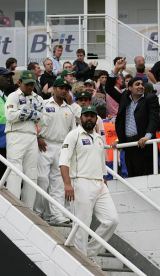
|

Just what fuelled the fire in Inzamam during the tea interval?
© Getty Images
|
|
The Darrell Hair affair has made cricket lovers think about ball-tampering, and the laws, and the umpires' powers, and the competence or otherwise of the game's ruling body. But there's something else it should make us think about: the role of television.
One of the minor mysteries of the case was why the Pakistanis at first accepted
the five-run penalty
, playing on for 20 minutes or so, and only refused to come out after tea. What happened over tea to make them so much angrier? This question now has an answer, although it appears to have emerged via journalism rather than the judicial process. In the
Sunday Telegraph, Richard Sydenham reported that the Pakistanis had the television on in their dressing-room, and Inzamam was stirred to action by some remarks from one of the Sky commentators, Rameez Raja.
Rameez's line was that the umpires had got it wrong. "It was a big decision [by the umpires] and I totally disagree with what happened out there," he said on air. "I am disgusted with the way the laws have been interpreted. You cannot tell whether the ball was scratched unless you catch somebody in the process. It's a needless controversy."
Sydenham's source, unnamed but inside the dressing room, says that after hearing this, "Inzamam was very angry and wanted to do something". So he made his protest, and the Test ground to a halt.
It's a sporting example of what physicists call the observer effect, when, by observing a situation, you change it. And it arouses mixed feelings, depending on the angle from which you view it.
I was watching Sky that afternoon and remember feeling uneasy at the rush to judgment. As television, the strong views expressed by Rameez and others, mainly Nasser Hussain and Mike Atherton, were a good thing. But as a contribution to the controversy, they were more questionable: they fanned the flames. Inzamam's no-show left a lot of airtime to be filled, and the ex-players became the first of many to take a harsh line on umpire Hair.
Rameez had had a good series in the sometimes tricky role of the visiting commentator and here, in the super-tricky position of having to comment on an unprecedented mess, he certainly read the situation astutely. He formed a view within minutes which was virtually identical to the one that took Ranjan Majugalle, ICC's judge and jury, a month. But here again, the process of observation may have affected events. Did that view seem to have more legitimacy because it had been on the telly?
 The saga shows how close and complicated the relationship between the game and the small screen has become
The saga shows how close and complicated the relationship between the game and the small screen has become
 |
Rameez and his colleagues were adamant that there had to be evidence of ball-tampering. The law doesn't say that. Perhaps common sense does. But viewers were left with the uncomfortable feeling that this was television seeing things through its own distorting lens, believing that if something wasn't picked up by its many cameras, it didn't happen.
Television reared its head again at two other key moments. When ICC's boss, Malcolm Speed, flew into London to hang Hair out to dry by disclosing his emailed offer to retire with a $500,000 pay-off, he chose to do so in a live televised press conference - an act of some viciousness. He has now come in for a fair amount of criticism, quite rightly, but at the time the media mostly swallowed his specious rationale about how the PCB's lawyers would have had to see the email anyway. As it occurred after the events that were being investigated, it is hard to see how it would have been relevant to the Code of Conduct hearing, let alone essential.
Then there was the hearing itself. Not many expert witnesses were called to the Legends Lounge at The Oval, but Inzamam's lawyers brought in Simon Hughes and Geoff Boycott. Why them, wasn't immediately clear. They could be relied upon to speak fluently, as that's their job, but neither has been an international bowler, umpire or match referee. They are respected commentators rather than genuine experts on the subject in hand. Boycott, true to form, seems to have talked about how he himself would have felt if he had been accused of cheating, which was utterly irrelevant.
The saga shows how close and complicated the relationship between the game and the small screen has become. Yet in some areas, it's not close enough. The hearing at The Oval has failed to clear the air as it should have, and one reason is that it was held in private. It was highly legalistic, with expensive lawyers on all sides, yet it lacked the basic courtesy, standard in English law, of being open to reporters and members of the public.
It should have been held in the open. In fact, it should have been televised.
Tim de Lisle is a former editor of Wisden. His Ashes blog is Ashes Buzz and his website is www.timdelisle.com
